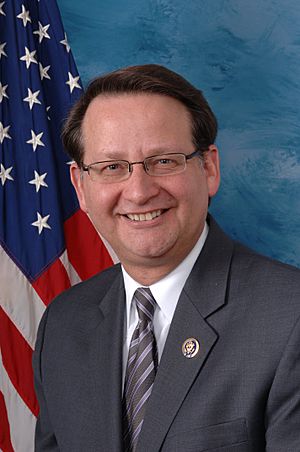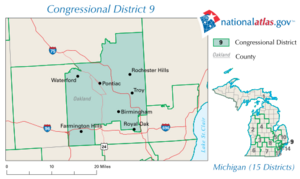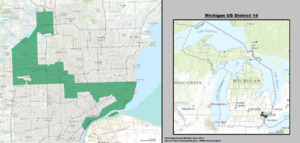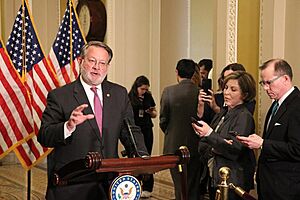Gary Peters facts for kids
Quick facts for kids
Gary Peters
|
|||||||||||||||||||||||||||||||||||||
|---|---|---|---|---|---|---|---|---|---|---|---|---|---|---|---|---|---|---|---|---|---|---|---|---|---|---|---|---|---|---|---|---|---|---|---|---|---|
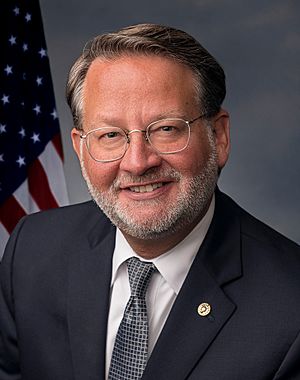
Official portrait, 2018
|
|||||||||||||||||||||||||||||||||||||
| United States Senator from Michigan |
|||||||||||||||||||||||||||||||||||||
| Assumed office January 3, 2015 Serving with Elissa Slotkin
|
|||||||||||||||||||||||||||||||||||||
| Preceded by | Carl Levin | ||||||||||||||||||||||||||||||||||||
|
|||||||||||||||||||||||||||||||||||||
| Member of the U.S. House of Representatives from Michigan |
|||||||||||||||||||||||||||||||||||||
| In office January 3, 2009 – January 3, 2015 |
|||||||||||||||||||||||||||||||||||||
| Preceded by | Joe Knollenberg | ||||||||||||||||||||||||||||||||||||
| Succeeded by | Brenda Lawrence | ||||||||||||||||||||||||||||||||||||
| Constituency |
|
||||||||||||||||||||||||||||||||||||
| Member of the Michigan Senate from the 14th district |
|||||||||||||||||||||||||||||||||||||
| In office January 3, 1995 – December 31, 2002 |
|||||||||||||||||||||||||||||||||||||
| Preceded by | Jon Cisky | ||||||||||||||||||||||||||||||||||||
| Succeeded by | Gilda Jacobs | ||||||||||||||||||||||||||||||||||||
| Personal details | |||||||||||||||||||||||||||||||||||||
| Born |
Gary Charles Peters
December 1, 1958 Pontiac, Michigan, U.S. |
||||||||||||||||||||||||||||||||||||
| Political party | Democratic | ||||||||||||||||||||||||||||||||||||
| Spouse | Colleen Ochoa | ||||||||||||||||||||||||||||||||||||
| Children | 3 | ||||||||||||||||||||||||||||||||||||
| Education |
|
||||||||||||||||||||||||||||||||||||
| Signature | |||||||||||||||||||||||||||||||||||||
| Website | |||||||||||||||||||||||||||||||||||||
| Military service | |||||||||||||||||||||||||||||||||||||
| Allegiance | |||||||||||||||||||||||||||||||||||||
| Branch | |||||||||||||||||||||||||||||||||||||
| Service years | 1993–2008 | ||||||||||||||||||||||||||||||||||||
| Rank | Lieutenant Commander | ||||||||||||||||||||||||||||||||||||
| Unit | Naval Construction Battalion | ||||||||||||||||||||||||||||||||||||
| Operation | Operation Southern Watch | ||||||||||||||||||||||||||||||||||||
| Awards | Navy and Marine Corps Achievement Medal | ||||||||||||||||||||||||||||||||||||
Gary Charles Peters (born December 1, 1958) is an American politician, lawyer, and former military officer. He is currently the U.S. Senator for Michigan, a role he has held since 2015. He is a member of the Democratic Party.
Before becoming a senator, Peters served in the United States House of Representatives from 2009 to 2015. He represented Michigan's 9th district and later the 14th district. He also served in the United States Navy Reserve and worked as an investment advisor.
Peters was elected to the Rochester Hills City Council in 1991. From 1995 to 2002, he represented the 14th district in the Michigan Senate. He was also the Michigan Lottery commissioner from 2003 to 2008. In 2014, Peters was elected to the U.S. Senate, taking over from Carl Levin. He was reelected in 2020.
Early Life and Education
Gary Charles Peters was born on December 1, 1958, in Pontiac, Michigan. His father, Herbert Garrett Peters, was a public school teacher and a U.S. Army veteran of World War II. His mother, Madeleine Vignier, was a nurse's aide. She met his father in France during the war.
Peters grew up in Oakland County and graduated from Rochester High School. He then attended Alma College, graduating in 1980 with a degree in political science. He later earned a Master of Business Administration from the University of Detroit in 1984. Peters also has degrees from Wayne State University and Michigan State University.
Military Service
Peters joined the United States Navy Reserve in 1993 when he was 34 years old. He served for over ten years in units at Selfridge Air National Guard Base. This included the Naval Mobile Construction Battalion 26. During his time in the Navy, Peters earned the Seabee Combat Warfare Specialist designation. He also worked as an assistant supply officer.
Peters's reserve duties included time in the Persian Gulf supporting Operation Southern Watch. He also served overseas after the September 11 attacks. Peters reached the rank of lieutenant commander before leaving the Reserve in 2008. He received awards such as the Navy and Marine Corps Achievement Medal.
Career in Business and Teaching
For 22 years, Peters worked as a financial advisor. He was an assistant vice president at Merrill Lynch and later a vice president at Paine Webber.
From 2007 to 2008, Peters was a special professor at Central Michigan University. In this part-time role, he taught classes and organized student activities. He also taught finance at Wayne State University and business courses at Oakland University. Peters also worked as a policy and financial analyst for the Michigan Department of Treasury.
Michigan State Senate (1995-2002)
Before serving in the Michigan State Senate, Peters was on the Rochester Hills City Council from 1991 to 1993.
State Senate Elections
After an earlier attempt in 1990, Peters was elected to the Michigan Senate in November 1994. He represented the 14th district, which is in Oakland County. This district includes cities like Pontiac and Southfield. Peters was reelected in 1998 and served until 2002. He left office due to the state's term limits.
Key Actions in the State Senate
Peters was chosen by his fellow Democrats to lead their group in the Senate. He also served on important commissions, including the Michigan Law Revision Commission. Peters sponsored a bill that stopped new wells from being drilled under the Great Lakes' state waters. This bill became law.
He was also the vice chairman of several Senate committees. These included the Finance, Education, Judiciary, and Economic Development Committees.
Statewide Roles
In 2002, Peters ran for Attorney General. He lost the election to Republican Mike Cox by a very small number of votes.
In 2003, Michigan Governor Jennifer Granholm appointed Peters as the Michigan Lottery commissioner. He held this position until 2008.
U.S. House of Representatives (2009–2015)
House Elections
2008 Election
In 2007, Peters announced he would run for Congress against Republican Joe Knollenberg. The district was the 9th, covering much of Oakland County. Peters won the election on November 4, 2008, with 52% of the votes. He was the first Democrat to represent this district in a long time.
2010 Election
In November 2010, Peters won reelection. He defeated several challengers, including Republican Andrew "Rocky" Raczkowski.
2012 Election
Due to changes in Michigan's population, the congressional districts were redrawn. Peters decided to run in the new 14th district. This district included parts of Detroit and Oakland County. In the August 2012 Democratic primary, Peters won against other candidates. He then won the general election with 82% of the vote.
Key Actions in the House
Peters was sworn into his first term in January 2009. During his time in the House, he voted for important laws. These included the Recovery Act (also known as the stimulus) and the Patient Protection and Affordable Care Act. He also supported the Lilly Ledbetter Fair Pay Act.
Peters worked with the Obama administration to help the Chrysler company with its debt. He was known for fighting to prevent the Detroit auto industry from going bankrupt. Peters also spoke out about the need to cut government spending. He formed a group with other Democrats to propose ways to reduce the national debt.
He showed support for the Occupy Wall Street movement in 2011. Peters said that Wall Street's actions had hurt the auto industry in Detroit. He also supported the United Nations Population Fund (UNFPA), which provides health services to women and families worldwide. In 2013, Peters was named a senior whip for the Democratic group in the House.
U.S. Senate (2015–present)
Senate Elections
2014 Election
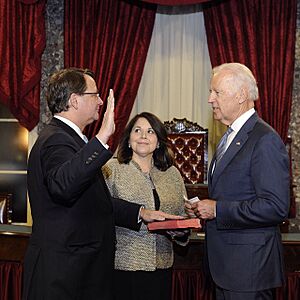
In 2014, Peters ran for the Senate seat that Carl Levin was leaving. Both Senator Levin and Senator Debbie Stabenow supported Peters. This made him the main Democratic candidate.
Peters won the election against Republican Terri Lynn Land. He had a consistent lead in polls during the campaign.
2020 Election
Peters ran for reelection in November 2020. He faced Republican John James. Peters won the election, though by a smaller margin than expected. Before the election, Peters shared a personal family experience about a serious health issue during pregnancy that required emergency medical care.
Key Actions in the Senate
On January 6, 2021, Peters was at the Capitol when supporters of Donald Trump stormed the building. Peters was evacuated from the Senate floor. He called the attacks "dangerous" and "an attack on our democracy." He also called for investigations into how the Capitol was breached. Peters led this investigation as chair of the Senate Homeland Security and Governmental Affairs Committee.
Committee Roles
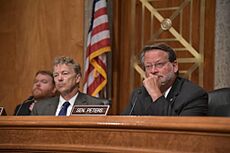
Peters serves on several important Senate committees:
- Committee on Appropriations
- Committee on Armed Services
- Committee on Commerce, Science, and Transportation
- Committee on Homeland Security and Governmental Affairs (He is the Chair of this committee.)
- Joint Economic Committee
Other Group Memberships
Peters is also part of special groups in the Senate, including:
- Rare Disease Caucus
- Senate Taiwan Caucus
Political Views

Peters is known for working with members of both parties. He was ranked as one of the most bipartisan U.S. senators. He was also ranked as the most effective senator in the 116th Congress (2019–2021).
Women's Rights and Healthcare
Peters has supported laws like the Paycheck Fairness Act. In 2015, he voted for the International Violence Against Women Act. He supports women's health choices.
Foreign Policy
China
In 2017, Peters supported a bill to strengthen the government's ability to prevent foreign companies from buying U.S. tech firms. This was in response to China's efforts to buy American companies. The bill aimed to protect national security.
Israel
In 2017, Peters supported the Israel Anti-Boycott Act. This bill would make it a federal crime for government contractors to support boycotts against Israel.
Gun Laws
Peters owns guns himself. After the 2016 Orlando nightclub shooting, he supported efforts to discuss gun control. In 2019, he helped introduce a bill that would require background checks for all firearm sales. This bill has some exceptions, like for temporary loans for hunting.
Healthcare Access
Peters voted for the Affordable Care Act in 2009. He has opposed attempts to cancel this law. He also supports a public option for Medicare to help more people get healthcare.
Immigration
In 2021, Peters voted against giving financial support to undocumented immigrants during the COVID-19 pandemic. In 2025, he voted for the Laken Riley Act.
Protecting Whistleblowers
On March 5, 2025, Peters introduced a bill called the Expanding Whistleblower Protections for Contractors Act. This bill aims to protect federal contractors who report waste or fraud from being punished.
Personal Life
Peters is married to Colleen Ochoa. They have three children and live in Bloomfield Township, Michigan. He is an Episcopalian.
Peters enjoys riding motorcycles and takes annual motorcycle tours of Michigan. He is a member of the Sons of the American Revolution. His ancestor, William Garrett, served in the Virginia Militia during the Revolutionary War.
Images for kids
See also
 In Spanish: Gary Peters (político) para niños
In Spanish: Gary Peters (político) para niños
 | Valerie Thomas |
 | Frederick McKinley Jones |
 | George Edward Alcorn Jr. |
 | Thomas Mensah |


